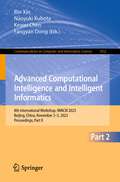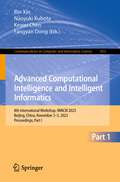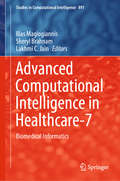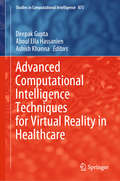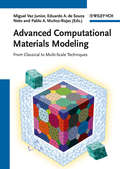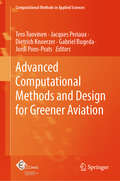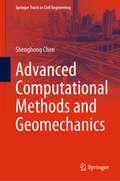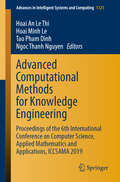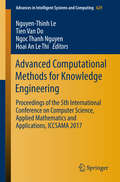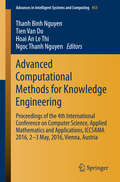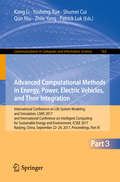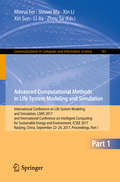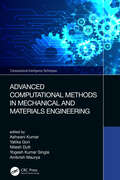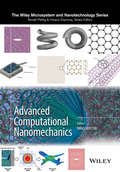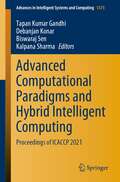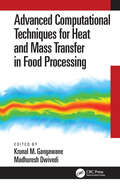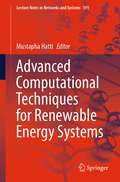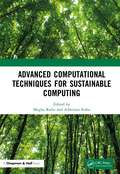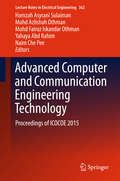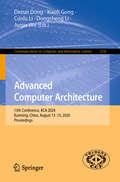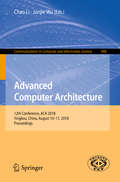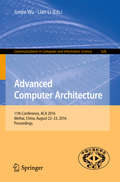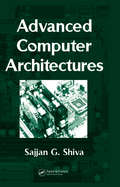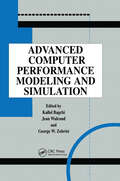- Table View
- List View
Advanced Computational Intelligence and Intelligent Informatics: 8th International Workshop, IWACIII 2023, Beijing, China, November 3–5, 2023, Proceedings, Part II (Communications in Computer and Information Science #1932)
by Bin Xin Naoyuki Kubota Kewei Chen Fangyan DongThis two-volume set constitutes the refereed proceedings of the 8th International Workshop on Advanced Computational Intelligence and Intelligent Informatics, IWACIII 2023, held in Beijing, China, in November 2023.The 56 papers presented were thoroughly reviewed and selected from the 118 qualifies submissions. They are organized in the topical sections on intelligent information processing; intelligent optimization and decision-making; pattern recognition and computer vision; advanced control; multi-agent systems; robotics.
Advanced Computational Intelligence and Intelligent Informatics: 8th International Workshop, IWACIII 2023, Beijing, China, November 3–5, 2023, Proceedings, Part I (Communications in Computer and Information Science #1931)
by Bin Xin Naoyuki Kubota Kewei Chen Fangyan DongThis two-volume set constitutes the refereed proceedings of the 8th International Workshop on Advanced Computational Intelligence and Intelligent Informatics, IWACIII 2023, held in Beijing, China, in November 2023.The 56 papers presented were thoroughly reviewed and selected from the 118 qualifies submissions. They are organized in the topical sections on intelligent information processing; intelligent optimization and decision-making; pattern recognition and computer vision; advanced control; multi-agent systems; robotics.
Advanced Computational Intelligence in Healthcare-7: Biomedical Informatics (Studies in Computational Intelligence #891)
by Lakhmi C. Jain Sheryl Brahnam Ilias MaglogiannisThis book presents state-of-the-art works and systematic reviews in the emerging field of computational intelligence (CI) in electronic health care. The respective chapters present surveys and practical examples of artificial intelligence applications in the areas of Human-Machine Interface (HMI) and affective computing, machine learning, big health data and visualization analytics, computer vision and medical image analysis. The book also addresses new and emerging topics in CI for health care such as the utilization of Social Media (SM) and the introduction of new intelligent paradigms in the security and privacy domains, which are critical for the health sector. The chapters, while of course not exhaustively addressing all the possible aspects of the aforementioned areas, are indicative of the dynamic nature of interdisciplinary research being pursued. Accordingly, the book is intended not only for researchers in the respective fields, but also for medical and administrative personnel working in the health sector, as well as managers and stakeholders responsible for making strategic decisions and defining public health policies.
Advanced Computational Intelligence Techniques for Virtual Reality in Healthcare (Studies in Computational Intelligence #875)
by Aboul Ella Hassanien Deepak Gupta Ashish KhannaThis book addresses the difficult task of integrating computational techniques with virtual reality and healthcare. It discusses the use of virtual reality in various areas, such as healthcare, cognitive and behavioural training, understanding mathematical graphs, human–computer interaction, fluid dynamics in healthcare industries, accurate real-time simulation, and healthcare diagnostics.Presenting the computational techniques for virtual reality in healthcare, it is a valuable reference resource for professionals at educational institutes as well as researchers, scientists, engineers and practitioners in industry.
Advanced Computational Materials Modeling: From Classical to Multi-Scale Techniques
by Pablo A. Munoz-Rojas Eduardo A. de Souza Neto Miguel Vaz JuniorWith its discussion of strategies for modeling complex materials using new numerical techniques, mainly those based on the finite element method, this monograph covers a range of topics including computational plasticity, multi-scale formulations, optimization and parameter identification, damage mechanics and nonlinear finite elements.
Advanced Computational Methods and Design for Greener Aviation (Computational Methods in Applied Sciences #59)
by Tero Tuovinen Jacques Periaux Jordi Pons-Prats Gabriel Bugeda Dietrich KnoerzerThis book presents a selection of scientific and technical results utilizing new computational methods, tools, and technologies in Aeronautical Design. Delve into the forefront of aerospace technology with this collection of articles featuring insights from the from the ECCOMAS CM3 2021 Thematic Conference in Barcelona and from the Special Technology Sessions of the ECCOMAS Congress 2022 in Oslo. Explore advancements in aeronautics design, numerical methods, and industrial technologies, including aerodynamic optimization and additive manufacturing, with contributions from leading experts and from research projects funded by the European Union. Whether you're a seasoned professional or a student, this volume offers invaluable insights into the future of aviation and transportation.
Advanced Computational Methods and Geomechanics (Springer Tracts in Civil Engineering)
by Shenghong ChenThe aim of this book is intended, through parallel expounding, to help readers comprehensively grasp the intrinsic features of typical advanced computational methods. These methods are created in recent three decades for the understanding of the post-failure of geo-materials accompanied with discontinuous and finite deformation/dislocation, as well as the violent fluid-structure interaction accompanied with strong distortion of water surface. The strong points and weak points of the formalisms for governing equations, the discretization schemes, the nodal interpolation /approximation of field variables, and their connectivity (via support domains, covers, or enrichments), the basic algorithms, etc., are clarified. Being aware of that the differences in these methods are not so large as at the first glance, this book will help readers to select appropriate methods, to improve the methods for their specific purpose, and to evaluate the reliability/applicability of the outcomes in the hazard evaluation of geotechnical (hydraulic) structures beyond extreme work situation. This book may be looked at as an advanced continuation of “Computational Geomechanics and Hydraulic Structures” by the author (2018) (Springer-Verlag, ISBN 978-981-10-8134-7) which elaborates the fundamental computational methods in geomechanics for the routine design of geotechnical (hydraulic) engineering.
Advanced Computational Methods for Knowledge Engineering: Proceedings of the 6th International Conference on Computer Science, Applied Mathematics and Applications, ICCSAMA 2019 (Advances in Intelligent Systems and Computing #1121)
by Hoai An Le Thi Hoai Minh Le Tao Pham Dinh Ngoc Thanh NguyenThis proceedings book contains 37 papers selected from the submissions to the 6th International Conference on Computer Science, Applied Mathematics and Applications (ICCSAMA 2019), which was held on 19–20 December, 2019, in Hanoi, Vietnam. The book covers theoretical and algorithmic as well as practical issues connected with several domains of Applied Mathematics and Computer Science, especially Optimization and Data Science. The content is divided into four major sections: Nonconvex Optimization, DC Programming & DCA, and Applications; Data Mining and Data Processing; Machine Learning Methods and Applications; and Knowledge Information and Engineering Systems. Researchers and practitioners in related areas will find a wealth of inspiring ideas and useful tools & techniques for their own work.
Advanced Computational Methods for Knowledge Engineering: Proceedings of the 5th International Conference on Computer Science, Applied Mathematics and Applications, ICCSAMA 2017 (Advances in Intelligent Systems and Computing #629)
by Ngoc Thanh Nguyen Tien Van Do Hoai An Le Thi Nguyen-Thinh LeThe proceedings consists of 30 papers which have been selected and invited from the submissions to the 2nd International Conference on Computer Science, Applied Mathematics and Applications (ICCSAMA 2014) held on 8-9 May, 2014 in Budapest, Hungary. The conference is organized into 7 sessions: Advanced Optimization Methods and Their Applications, Queueing Models and Performance Evaluation, Software Development and Testing, Computational Methods for Mobile and Wireless Networks, Computational Methods for Knowledge Engineering, Logic Based Methods for Decision Making and Data Mining and Nonlinear Systems and Applications, respectively. All chapters in the book discuss theoretical and practical issues connected with computational methods and optimization methods for knowledge engineering. The editors hope that this volume can be useful for graduate and Ph. D. students and researchers in Computer Science and Applied Mathematics. It is the hope of the editors that readers of this volume can find many inspiring ideas and use them to their research. Many such challenges are suggested by particular approaches and models presented in individual chapters of this book.
Advanced Computational Methods for Knowledge Engineering: Proceedings of the 4th International Conference on Computer Science, Applied Mathematics and Applications, ICCSAMA 2016, 2-3 May, 2016, Vienna, Austria (Advances in Intelligent Systems and Computing #453)
by Thanh Binh Nguyen Tien Van Do Hoai An Le Thi Ngoc Thanh NguyenThis proceedings consists of 20 papers which have been selected and invited from the submissions to the 4th International Conference on Computer Science, Applied Mathematics and Applications (ICCSAMA 2016) held on 2-3 May, 2016 in Laxenburg, Austria. The conference is organized into 5 sessions: Advanced Optimization Methods and Their Applications, Models for ICT applications, Topics on discrete mathematics, Data Analytic Methods and Applications and Feature Extractio, respectively. All chapters in the book discuss theoretical and practical issues connected with computational methods and optimization methods for knowledge engineering. The editors hope that this volume can be useful for graduate and Ph.D. students and researchers in Applied Sciences, Computer Science and Applied Mathematics.
Advanced Computational Methods in Energy, Power, Electric Vehicles, and Their Integration: International Conference on Life System Modeling and Simulation, LSMS 2017 and International Conference on Intelligent Computing for Sustainable Energy and Environment, ICSEE 2017, Nanjing, China, September 22-24, 2017, Proceedings, Part III (Communications in Computer and Information Science #763)
by Kang Li, Yusheng Xue, Shumei Cui, Qun Niu, Zhile Yang and Patrick LukThe three-volume set CCIS 761, CCIS 762, and CCIS 763 constitutes the thoroughly refereed proceedings of the International Conference on Life System Modeling and Simulation, LSMS 2017, and of the International Conference on Intelligent Computing for Sustainable Energy and Environment, ICSEE 2017, held in Nanjing, China, in September 2017. The 208 revised full papers presented were carefully reviewed and selected from over 625 submissions.The papers of this volume are organized in topical sections on: Biomedical Signal Processing; Computational Methods in Organism Modeling; Medical Apparatus and Clinical Applications; Bionics Control Methods, Algorithms and Apparatus; Modeling and Simulation of Life Systems; Data Driven Analysis; Image and Video Processing; Advanced Fuzzy and Neural Network Theory and Algorithms; Advanced Evolutionary Methods and Applications; Advanced Machine Learning Methods and Applications; Intelligent Modeling, Monitoring, and Control of Complex Nonlinear Systems; Advanced Methods for Networked Systems; Control and Analysis of Transportation Systems; Advanced Sliding Mode Control and Applications; Advanced Analysis of New Materials and Devices; Computational Intelligence in Utilization of Clean and Renewable Energy Resources; Intelligent Methods for Energy Saving and Pollution Reduction; Intelligent Methods in Developing Electric Vehicles, Engines and Equipment; Intelligent Computing and Control in Power Systems; Modeling, Simulation and Control in Smart Grid and Microgrid; Optimization Methods; Computational Methods for Sustainable Environment.
Advanced Computational Methods in Life System Modeling and Simulation: International Conference on Life System Modeling and Simulation, LSMS 2017 and International Conference on Intelligent Computing for Sustainable Energy and Environment, ICSEE 2017, Nanjing, China, September 22-24, 2017, Proceedings, Part I (Communications in Computer and Information Science #761)
by Xin Li Xin Sun Zhou Su Minrui Fei Shiwei Ma Li JiaThe three-volume set CCIS 761, CCIS 762, and CCIS 763 constitutes the thoroughly refereed proceedings of the International Conference on Life System Modeling and Simulation, LSMS 2017, and of the International Conference on Intelligent Computing for Sustainable Energy and Environment, ICSEE 2017, held in Nanjing, China, in September 2017. The 208 revised full papers presented were carefully reviewed and selected from over 625 submissions. The papers of this volume are organized in topical sections on: Biomedical Signal Processing; Computational Methods in Organism Modeling; Medical Apparatus and Clinical Applications; Bionics Control Methods, Algorithms and Apparatus; Modeling and Simulation of Life Systems; Data Driven Analysis; Image and Video Processing; Advanced Fuzzy and Neural Network Theory and Algorithms; Advanced Evolutionary Methods and Applications; Advanced Machine Learning Methods and Applications; Intelligent Modeling, Monitoring, and Control of Complex Nonlinear Systems; Advanced Methods for Networked Systems; Control and Analysis of Transportation Systems; Advanced Sliding Mode Control and Applications; Advanced Analysis of New Materials and Devices; Computational Intelligence in Utilization of Clean and Renewable Energy Resources; Intelligent Methods for Energy Saving and Pollution Reduction; Intelligent Methods in Developing Electric Vehicles, Engines and Equipment; Intelligent Computing and Control in Power Systems; Modeling, Simulation and Control in Smart Grid and Microgrid; Optimization Methods; Computational Methods for Sustainable Environment.
Advanced Computational Methods in Mechanical and Materials Engineering (Computational Intelligence Techniques)
by Kumar Ashwani Gori Yatika Dutt Nitesh Singla Kumar Maurya AmbrishThis book provides in-depth knowledge to solve engineering, geometrical, mathematical, and scientific problems with the help of advanced computational methods with a focus on mechanical and materials engineering. Divided into three subsections covering design and fluids, thermal engineering and materials engineering, each chapter includes exhaustive literature review along with thorough analysis and future research scope. Major topics covered pertains to computational fluid dynamics, mechanical performance, design, and fabrication including wide range of applications in industries as automotive, aviation, electronics, nuclear and so forth. Covers computational methods in design and fluid dynamics with a focus on computational fluid dynamics Explains advanced material applications and manufacturing in labs using novel alloys and introduces properties in material Discusses fabrication of graphene reinforced magnesium metal matrix for orthopedic applications Illustrates simulation and optimization gear transmission, heat sink and heat exchangers application Provides unique problem-solution approach including solutions, methodology, experimental setup, and results validation This book is aimed at researchers, graduate students in mechanical engineering, computer fluid dynamics,fluid mechanics, computer modeling, machine parts, and mechatronics.
Advanced Computational Nanomechanics
by Nuno SilvestreContains the latest research advances in computational nanomechanics in one comprehensive volume Covers computational tools used to simulate and analyse nanostructures Includes contributions from leading researchers Covers of new methodologies/tools applied to computational nanomechanics whilst also giving readers the new findings on carbon-based aggregates (graphene, carbon-nanotubes, nanocomposites) Evaluates the impact of nanoscale phenomena in materials
Advanced Computational Paradigms and Hybrid Intelligent Computing: Proceedings of ICACCP 2021 (Advances in Intelligent Systems and Computing #1373)
by Tapan Kumar Gandhi Debanjan Konar Biswaraj Sen Kalpana SharmaThis book presents high-quality, peer-reviewed papers from the Third International Conference on Advanced Computational and Communication Paradigms (ICACCP 2021), organized by Department of Computer Science and Engineering (CSE), Sikkim Manipal Institute of Technology (SMIT), Sikkim, India during 22 – 24 March 2021. ICACCP 2021 covers an advanced computational paradigms and communications technique which provides failsafe and robust solutions to the emerging problems faced by mankind. Technologists, scientists, industry professionals and research scholars from regional, national and international levels are invited to present their original unpublished work in this conference.
Advanced Computational Techniques for Heat and Mass Transfer in Food Processing
by Krunal M. GangawaneComputational methods have risen as a powerful technique for exploring the system phenomena and solving real-life problems. Currently, there are two principle computational approaches for system analysis: continuous and discrete. In the continuous approach, the governing equations can be obtained by applying the fundamental laws, such as conservation of mass, momentum, and energy over an infinitesimal control volume. On the other hand, the discrete approach concentrates on mimicking the molecular movement within the system. Both approaches have pros and cons, and continuous development and improvement in the existing computational methods are ongoing. Advanced Computational Techniques for Heat and Mass Transfer in Food Processing provides, in a single source, information on the use of methods based on numerical and computational analysis as applied in food science and technology. It explores the use of various numerical/computational techniques for the simulation of fluid flow and heat and mass transfer within food products. Key Features: Explores various numerical techniques used for modeling and validation Describes the knowhow of numerical and computational techniques for food process operations Covers a detailed numerical or computational approach of the principles of heat and mass transfer in the food processing operation Discusses the detailed computational simulation procedure of the food operation Recent years have witnessed a rapid development in the field of computational techniques owing to its abundant benefit to the food processing industry. The relevance of advanced computational methods has helped in understanding the fundamental physics of thermal and hydrodynamic behavior that can provide benefits to the food processing industry in numerous applications. As a single information source for those interested in the use of methods based on numerical and computational analysis as applied in food science and technology, this book will ably serve any food academician or researcher in learning the advanced numerical techniques exploring fluid flow, crystallization, and other food processing operations.
Advanced Computational Techniques for Renewable Energy Systems (Lecture Notes in Networks and Systems #591)
by Mustapha HattiIn this book, one hundred selected articles, in which the technology and science elite share, contribute to technology development, collaborate and evolve the latest cutting-edge technologies, open ecosystem resources, new innovative computing solutions, hands-on labs and tutorials, networking and community building, to ensure better integration of artificial intelligence into renewable energy systems. Innovation in computing continues at a growing pace. The key to success in this area is not only hardware, but also the ability to leverage rapid advances in artificial intelligence (including machine learning and deep learning), data analytics, data streaming, and cloud computing, which go hand in hand with intensive research activity on the underlying computational methods. The chapters in this book are organized into thematic sections on: advanced computing techniques; artificial intelligence; smart and sustainable cities; renewable energy systems; materials in renewable energy; smart energy efficiency; smart cities applications: recent developments and new trends; online, supervision of renewable energy platforms; predictive control in renewable systems; smart embedded systems for photovoltaic applications.
Advanced Computational Techniques for Sustainable Computing
by Megha RathiAdvanced Computational Techniques for Sustainable Computing is considered multi-disciplinary field encompassing advanced computational techniques across several domain, including, Computer Science, Statistical Computation and Electronics Engineering. The core idea of sustainable computing is to deploy algorithms, models, policies and protocols to improve energy efficiency and management of resources, enhancing ecological balance, biological sustenance and other services on societal contexts. The book offers comprehensive coverage of the most essential topics, and: Provides insight on building smart sustainable solutions Includes details of applying mining, learning, IOT and sensor-based techniques for sustainable computing Entails data extraction from various sources followed with pre-processing of data, and how to make effective use of extracted data for application-based research Involves practical usage of data analytic language, including R, Python, etc. for improving sustainable services offered by multi-disciplinary domains Encompasses comparison and analysis of recent technologies and trends Includes development of smart models for information gain and effective decision making with visualization The readers would get acquainted with the utilization of massive data sets for intelligent mining and processing. It includes the integration of data mining techniques for effective decision-making in the social, economic, and global environmental domains to achieve sustainability. The implementation of computational frameworks can be accomplished using open-source software for the building of resource-efficient models. The content of the book demonstrates the usage of data science and the internet of things for the advent of smart and realistic solutions for attaining sustainability.
Advanced Computational Vibroacoustics
by Roger OhayonAdvanced Computational Vibroacoustics presents an advanced computational method for the prediction of sound and structural vibrations, in low- and medium-frequency ranges - complex structural acoustics and fluid-structure interaction systems encountered in aerospace, automotive, railway, naval, and energy-production industries. The formulations are presented within a unified computational strategy and are adapted for the present and future generation of massively parallel computers. A reduced-order computational model is constructed using the finite element method for the damped structure and the dissipative internal acoustic fluid (gas or liquid with or without free surface) and using an appropriate symmetric boundary-element method for the external acoustic fluid (gas or liquid). This book allows direct access to computational methods that have been adapted for the future evolution of general commercial software. Written for the global market, it is an invaluable resource for academic researchers, graduate students, and practising engineers.
Advanced Computer and Communication Engineering Technology: Proceedings of ICOCOE 2015 (Lecture Notes in Electrical Engineering #362)
by Hamzah Asyrani Sulaiman Mohd Azlishah Othman Mohd Fairuz Iskandar Othman Yahaya Abd Rahim Naim Che PeeThis book covers diverse aspects of advanced computer and communication engineering, focusing specifically on industrial and manufacturing theory and applications of electronics, communications, computing and information technology. Experts in research, industry, and academia present the latest developments in technology, describe applications involving cutting-edge communication and computer systems and explore likely future directions. In addition, access is offered to numerous new algorithms that assist in solving computer and communication engineering problems. The book is based on presentations delivered at ICOCOE 2014, the 1st International Conference on Communication and Computer Engineering. It will appeal to a wide range of professionals in the field, including telecommunication engineers, computer engineers and scientists, researchers, academics and students.
Advanced Computer Architecture: 13th Conference, ACA 2020, Kunming, China, August 13–15, 2020, Proceedings (Communications in Computer and Information Science #1256)
by Dezun Dong Xiaoli Gong Cunlu Li Dongsheng Li Junjie WuThis book constitutes the refereed proceedings of the 13th Conference on Advanced Computer Architecture, ACA 2020, held in Kunming, China, in August 2020. Due to the COVID-19 pandemic the conference was held online. The 24 revised full papers presented were carefully reviewed and selected from 105 submissions. The papers of this volume are organized in topical sections on: interconnection network, router and network interface architecture; accelerator-based, application-specific and reconfigurable architecture; processor, memory, and storage systems architecture; model, simulation and evaluation of architecture; new trends of technologies and applications.
Advanced Computer Architecture: 10th Annual Conference, Aca 2014, Shenyang, China, August 23-24, 2014. Proceedings (Communications In Computer And Information Science #451)
by Chao Li Junjie WuThis book constitutes the refereed proceedings of the 12th Annual Conference on Advanced Computer Architecture, ACA 2018, held in Yingkou, China, in August 2018. The 17 revised full papers presented were carefully reviewed and selected from 80 submissions. The papers of this volume are organized in topical sections on: accelerators; new design explorations; towards efficient ML/AI; parallel computing system.
Advanced Computer Architecture: 11th Conference, ACA 2016, Weihai, China, August 22-23, 2016, Proceedings (Communications in Computer and Information Science #626)
by Junjie Wu Lian LiThis book constitutes the refereed proceedings of the 11th Annual Conference on Advanced Computer Architecture, ACA 2016, held in Weihai, China, in August 2016. The 17 revised full papers presented were carefully reviewed and selected from 89 submissions. The papers address issues such as processors and circuits; high performance computing; GPUs and accelerators; cloud and data centers; energy and reliability; intelligence computing and mobile computing.
Advanced Computer Architectures
by Sajjan G. ShivaDespite the tremendous advances in performance enabled by modern architectures, there are always new applications and demands arising that require ever-increasing capabilities. Keeping up with these demands requires a deep-seated understanding of contemporary architectures in concert with a fundamental understanding of basic principles that allows one to anticipate what will be possible over the system's lifetime. Advanced Computer Architectures focuses on the design of high performance supercomputers with balanced coverage of the hardware, software structures, and application characteristics.This book is a timeless distillation of underlying principles punctuated by real-world implementations in popular current and past commercially available systems. It briefly reviews the basics of uniprocessor architecture before outlining the most popular processing paradigms, performance evaluation, and cost factor considerations. This builds to a discussion of pipeline design and vector processors, data parallel architectures, and multiprocessor systems. Rounding out the book, the final chapter explores some important current and emerging trends such as Dataflow, Grid, biology-inspired, and optical computing. More than 220 figures, tables, and equations illustrate the concepts presented.Based on the author's more than thirty years of teaching and research, Advanced Computer Architectures endows you with the tools necessary to reach the limits of existing technology, and ultimately, to break them.
Advanced Computer Performance Modeling and Simulation
by Kallol Bagchi Jean Walrand George W. ZobristAddresses the major issues involved in computer design and architectures. Dealing primarily with theory, tools, and techniques as related to advanced computer systems, it provides tutorials and surveys and relates new important research results. Each chapter provides background information, describes and analyzes important work done in the field, and provides important direction to the reader on future work and further readings. The topics covered include hierarchical design schemes, parallel and distributed modeling and simulation, parallel simulation tools and techniques, theoretical models for formal and performance modeling, and performance evaluation techniques.
